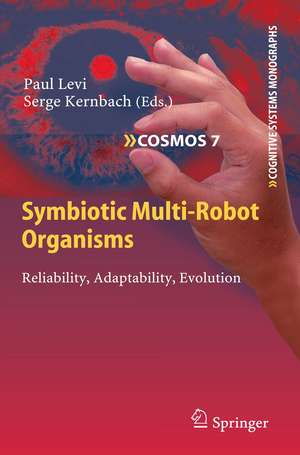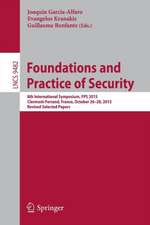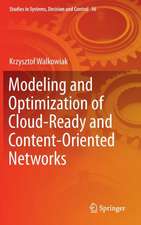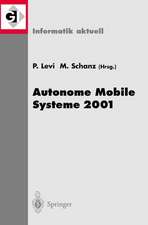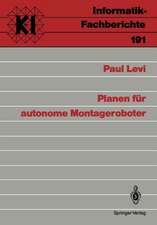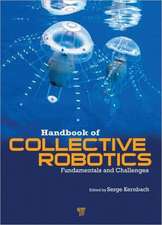Symbiotic Multi-Robot Organisms: Reliability, Adaptability, Evolution: Cognitive Systems Monographs, cartea 7
Editat de Paul Levi, Serge Kernbachen Limba Engleză Paperback – 5 sep 2012
| Toate formatele și edițiile | Preț | Express |
|---|---|---|
| Paperback (1) | 996.88 lei 6-8 săpt. | |
| Springer Berlin, Heidelberg – 5 sep 2012 | 996.88 lei 6-8 săpt. | |
| Hardback (1) | 1001.49 lei 6-8 săpt. | |
| Springer Berlin, Heidelberg – 4 iun 2010 | 1001.49 lei 6-8 săpt. |
Din seria Cognitive Systems Monographs
- 15%
 Preț: 647.59 lei
Preț: 647.59 lei - 20%
 Preț: 645.31 lei
Preț: 645.31 lei - 18%
 Preț: 957.62 lei
Preț: 957.62 lei - 15%
 Preț: 632.55 lei
Preț: 632.55 lei - 15%
 Preț: 643.99 lei
Preț: 643.99 lei - 20%
 Preț: 1447.17 lei
Preț: 1447.17 lei - 15%
 Preț: 629.73 lei
Preț: 629.73 lei - 15%
 Preț: 633.02 lei
Preț: 633.02 lei - 15%
 Preț: 639.90 lei
Preț: 639.90 lei - 20%
 Preț: 643.50 lei
Preț: 643.50 lei - 15%
 Preț: 640.55 lei
Preț: 640.55 lei - 15%
 Preț: 641.71 lei
Preț: 641.71 lei - 5%
 Preț: 1103.75 lei
Preț: 1103.75 lei - 15%
 Preț: 637.59 lei
Preț: 637.59 lei - 15%
 Preț: 648.24 lei
Preț: 648.24 lei - 20%
 Preț: 650.40 lei
Preț: 650.40 lei -
 Preț: 391.02 lei
Preț: 391.02 lei - 15%
 Preț: 643.48 lei
Preț: 643.48 lei - 20%
 Preț: 663.61 lei
Preț: 663.61 lei - 20%
 Preț: 652.54 lei
Preț: 652.54 lei - 20%
 Preț: 699.43 lei
Preț: 699.43 lei - 15%
 Preț: 640.88 lei
Preț: 640.88 lei - 20%
 Preț: 657.67 lei
Preț: 657.67 lei - 20%
 Preț: 1000.04 lei
Preț: 1000.04 lei - 20%
 Preț: 648.44 lei
Preț: 648.44 lei - 18%
 Preț: 886.92 lei
Preț: 886.92 lei - 20%
 Preț: 647.61 lei
Preț: 647.61 lei - 20%
 Preț: 651.09 lei
Preț: 651.09 lei - 20%
 Preț: 1161.71 lei
Preț: 1161.71 lei - 15%
 Preț: 642.68 lei
Preț: 642.68 lei - 20%
 Preț: 649.93 lei
Preț: 649.93 lei - 18%
 Preț: 944.19 lei
Preț: 944.19 lei
Preț: 996.88 lei
Preț vechi: 1246.10 lei
-20% Nou
Puncte Express: 1495
Preț estimativ în valută:
190.76€ • 203.98$ • 159.05£
190.76€ • 203.98$ • 159.05£
Carte tipărită la comandă
Livrare economică 17 aprilie-01 mai
Preluare comenzi: 021 569.72.76
Specificații
ISBN-13: 9783642263583
ISBN-10: 3642263585
Pagini: 496
Ilustrații: XXIV, 470 p. 104 illus. in color.
Dimensiuni: 155 x 235 x 26 mm
Greutate: 0.69 kg
Ediția:2010
Editura: Springer Berlin, Heidelberg
Colecția Springer
Seria Cognitive Systems Monographs
Locul publicării:Berlin, Heidelberg, Germany
ISBN-10: 3642263585
Pagini: 496
Ilustrații: XXIV, 470 p. 104 illus. in color.
Dimensiuni: 155 x 235 x 26 mm
Greutate: 0.69 kg
Ediția:2010
Editura: Springer Berlin, Heidelberg
Colecția Springer
Seria Cognitive Systems Monographs
Locul publicării:Berlin, Heidelberg, Germany
Public țintă
ResearchCuprins
Concepts of Symbiotic Robot Organisms.- Heterogeneous Multi-Robot Systems.- Cognitive Approach in Artificial Organisms.- Adaptive Control Mechanisms.- Learning, Artificial Evolution and Cultural Aspects of Symbiotic Robotics.- Final Conclusions.
Textul de pe ultima copertă
This book is devoted to the study of the evolution of self-organised multicellular structures and the remarkable transition from unicellular to multicellular life. Multicellular organisms provide the inspiration for the development of novel principles of adaptation and evolution for robotics and, in particular, for so-called multi-robot organisms. Multi-robot organisms are defined as large-scale swarms of robots that can physically dock with each other and symbiotically share energy and computational resources within a single "artificial-life-form". When it is advantageous to do so, these robots can dynamically aggregate and self-assemble into one or many symbiotic organisms in order to collectively interact with the physical world via a variety of sensors and actuators. Bio-inspired evolutionary paradigms, combined with robot embodiment and swarm-emergent phenomena, enable the organisms to autonomously manage their own hardware and software organisation. In this way, artificial robotic organisms become self-configuring from both hardware and software perspectives. This could lead to not only extremely adaptive, evolve-able and scalable robotic systems, but robot organisms also able to reprogram themselves without human supervision and new, previously unforeseen, functionality to emerge. This book introduces new concepts for symbiotic robot organisms and reports on experience of researching and developing such systems. In the long term it is intended to apply this experience in the construction and maintenance of real-world technical systems based on these concepts.
Caracteristici
Recent research results in the emerging field of Symbiotic Robotics Written by experts in the field State of the art book on symbiotic multi-robot organisms
